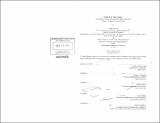Ghost in the shell : econometric forecast of Singapore's office market and where is architect in financial time
Author(s)
Sun, Aoran Alex
DownloadFull printable version (49.01Mb)
Alternative title
Econometric forecast of Singapore's office market and where is architect in financial time
Other Contributors
Massachusetts Institute of Technology. Center for Real Estate. Program in Real Estate Development.
Advisor
William C. Wheaton and Michael Dennis.
Terms of use
Metadata
Show full item recordAbstract
Inspired by Singapore's recent effort in building its new skyline in Maria Bay, the thesis intends to employ econometric structural modeling techniques to Singapore's office market for the period from 1975 to 2011. Using data collected from Singapore's Urban Redevelopment Authority, the regression models established by rent, demand and supply equations, dissect the market behavior and project an understanding of the underlying correlation and market mechanism. With which, the thesis forecasts for the next 10 years, in quarterly interval, the movement trajectory of Singapore's office market. Living and working as activities in this current milieu where role play in the system of power are essential to success was problematized; In the era when social and financial "cloud participation" has given rise to ebay, Facebook, Twitter and Wikipedia, what does work, live and play mean in this current environment where indulgence and consumption for its very own sake is very much part of the cultural lifestyle. Where is Architect in this financial time? In as much as it is about providing plausible answers, this thesis challenges the existing power system in the Real Estate industry, instead of taking dweller's spatial appropriation as guerrilla activities, the thesis proposes ways that channels private equity "financial cloud participation" into system of value production. Architectural proposition therefore works in way which turns these underlying power struggle scenarios into formal expression.
Description
Thesis (M. Arch.)--Massachusetts Institute of Technology, Dept. of Architecture; and, (S.M. in Real Estate Development)--Massachusetts Institute of Technology, Program in Real Estate Development in Conjunction with the Center for Real Estate, 2012. Page 143 blank. Cataloged from PDF version of thesis. Includes bibliographical references (p. 135-137).
Date issued
2012Department
Massachusetts Institute of Technology. Center for Real Estate. Program in Real Estate Development.; Massachusetts Institute of Technology. Center for Real Estate; Massachusetts Institute of Technology. Department of ArchitecturePublisher
Massachusetts Institute of Technology
Keywords
Architecture., Center for Real Estate. Program in Real Estate Development.